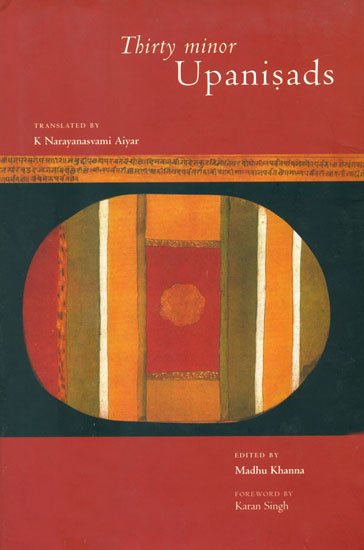Thirty minor Upanishads
by K. Narayanasvami Aiyar | 1914 | 95,228 words
This book contains the English translation of thirty minor Upanishads.—Fourteen belonging to Vedanta, two are categorised as Physiological, three are Mantra, two are Sannyasa and the remaining nine are categorised as Yoga-Upanishads. These Upanishads are properly defined as the Aranya-portion of the Vedas (most ancient Hindu scriptures) and are so-...
Narada Parivrajaka Upanishad of Atharvaveda, Chapter I
Om. Once upon a time, Nārada, the ornament of Parivrājakas (roaming ascetics), after roaming over all worlds and cleansing, through merely by looking at the places of pilgrimage able to impart rare religious merits, observed, with a mind that had attained purity, without hate, quiescent and patient, and indifferent towards all (objects), the forest of Naimiśa (the modern Nimsār), filled with Ṛṣis that were engaged in the contemplation of Reality and had attained the greatness of the ordained bliss; (there) through the recitation of stories about Hari (Viṣṇu), associated with the musical motes of Sa, Ri, Ga, Ma, Pa, Dha, and Ni (of the gamut), able to impart indifference to objects and to make one look down upon the universe, and instilling divine devotion, fixed and movable (or mental and bodily), he entered (the forest), fascinating the crowds of beings human, animal, Kimpuruṣas[1] , celestials, Kinnaras,[2] Apsaras (Houris), and Uragas[3] (collected there). (Thereupon the) great Ṛṣis Śāunaka and others who had been engaged for twelve years in sattra sacrifice well-skilled in the recitation of Vedas, the knowers of all, and the good practisers of tapas, observed Nārada the son of Brahma and the devotee of the Lord, and having risen up, paid due respect to him. Then having with due respect requested him to sit down, they also seated themselves and addressed him thus: "O Lord, son of Brahma, what is the means of salvation for us? It is meet that it should be communicated (to us)." Thus addressed, Nārada replied to them thus: "One born in a good family and fit to go through the forty-four saṃskāras, upanayana and others, should, under a teacher to whom he is devoted, study, after the recitation of the Veda of his own śākhā (division), all the different branches of knowledge; then should fulfil, according to the rules ordained, for twelve years the observance of Brahmacarya (celibacy), such as the service of the guru, etc.; then for twenty-five years the āśrama (order of life) of a gṛhastha (householder), and for twenty-five years the āśrama of a vānaprastha (forester). After thus practising well the fourfold celibacy,[4] the sixfold[5] householder's life, and the fourfold[6] forester's life, and having performed all the duties thereof, he should acquire the fourfold[7] means of salvation; thus the sannyāsin who gives up the desires along with the karmas of mind, speech, and body in this saṃsāra as well as the vāsanā towards the threefold desire (of son, wife, and wealth), and being without malice and endowed with quiescence and patience, undisturbed in the order of life of Paramahaṃsa, quits the body in the contemplation of Reality, is an emancipated person. Such is the Upaniṣad."
Footnotes and references:
[2]:
A higher being with a human form but with the head of a horse.
[4]:
The four Brahmacaryas are: (1) Gāyatrī; (2) Prājāpatya; (3) Vaidika; (4) Naiṣṭika.
[5]:
[6]:
The four Vānaprasthas are: (1) Audumbara; (2) Vaikhānasa; (3) Samprakṣāli; (4) Paurṇama.
